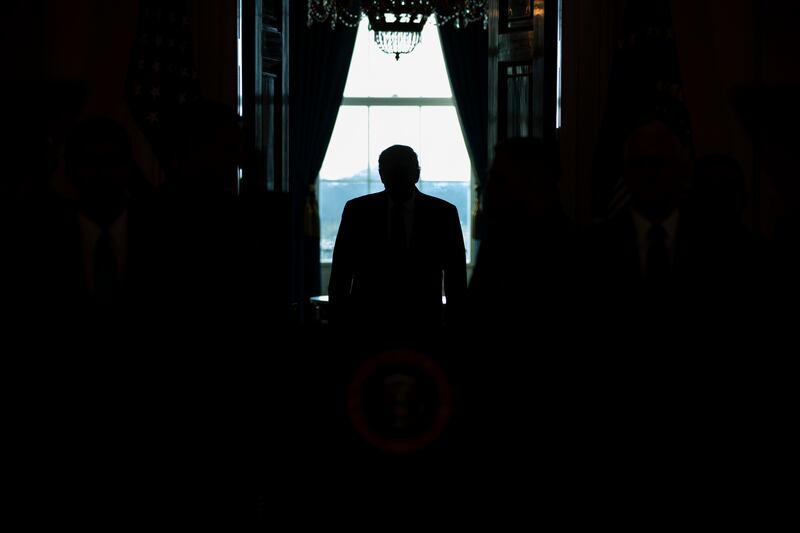President Trump is about to make a monumental decision — whether to strike Iran’s nuclear program or not. It is a decision as critical to his presidency, popularity and party, as well as our nation and the world, as President George W. Bush’s decision to invade Iraq to destroy the threat of Saddam Hussein’s weapons of mass destruction.
Before the final round of negotiations with Iran over a nuclear deal, Israeli Prime Minister Benjamin Netanyahu made the critical decision to launch a war aimed at destroying the Ayatollah’s nuclear and ballistic missile programs. As Secretary Marco Rubio stated on June 12, “Israel took unilateral action against Iran. We are not involved in strikes against Iran.”
On the surface, the president faces a straightforward tactical decision. A week after Israel successfully struck several key parts of Iran’s nuclear program, including facilities at Natanz, Isfahan and Arak, Netanyahu faces a challenge. He cannot destroy the Fordow Fuel Enrichment Plant, an underground facility deep within a mountain near the holy city of Qom, without President Trump authorizing the use of the most powerful conventional bomb in the U.S. arsenal, the GBU-57 Massive Ordnance Penetrator, also known as “a bunker buster.” Additionally, this would mean direct U.S. involvement: the only aircraft capable of conducting multiple strikes against Fordow are B-2 stealth bombers.
On June 19, the president rightly slowed the rush to war. Noting the ongoing diplomatic negotiations, he issued a statement saying, “I will make my decision whether or not to go [strike Iran] within the next two weeks.”
President Trump rose to power as one of the sharpest critics of President Bush’s ill-advised decision to go to war in Iraq, as well as President Biden’s disastrous withdrawal from Afghanistan — moral and military failures that shattered trust in American power, institutions and allies. He understands that despite our hubris as a superpower, American military might has its limits. Like with Iraq, the shock and awe of dropping the GBU-57 on a mountain in Iran might allow Netanyahu to boast about destroying Iran’s nuclear program, but it will almost certainly revive the myth of the United States as the Great Satan and lead to even greater hostility toward Israel.
As with 9/11 and October 7, President Trump knows that if we drop our bunker buster on Fordow, Iranians will likely rally around their flag just as Americans and Israelis have done. While we have damaged Iran’s nuclear program, dropping the bunker buster bomb could also revive the fortunes of a bankrupt theocracy. Iran’s leaders will spin themselves as victims and martyrs of Israeli and American aggression, rather than as the fundamentalist spawn of Khomeini — an enemy of Iranian nationalism.
Furthermore, similar to Vietnam and Iraq, a prolonged conflict with Iran without a political or diplomatic solution in sight could drain American blood and treasure for years to come. Whatever short-term boost Netanyahu gains in Israel, entering a war with Iran right after the Gaza conflict will not only strain Israel’s citizens and military to the limit but also likely deepen divisions between the United States and its allies in Europe and the Islamic world, including Turkey, Pakistan, Saudi Arabia and Egypt. China and Russia would benefit from the United States making another costly and major strategic error — all of which President Trump had promised to undo by “Mak(ing) America Great Again.”
The truth is that Israel’s attack has achieved what the Iranian people could not. It has broken Ayatollah Khamenei’s grip on Iran and the Islamic Republic’s standing in the Islamic world. This defeat is as decisive and humiliating as the one faced by Egyptian President Gamal Abdel Nasser after the Six-Day War. The challenge now, as it was then, is that if Israel leverages its advantage with the aim of “forging a coalition for Iran’s partition,” as editors of the Jerusalem Post recently urged President Trump to do, Israel’s military will win the war only for politicians to lose the peace: Iran’s natural transition to a post-fundamentalist, stable and democratic force for good.
What is now clear to everyone — including the rank and file of the Islamic Revolutionary Guard Corps — is that the Ayatollah has wagered and lost his nuclear gamble. It is time for a reckoning. Iran’s nuclear program is severely damaged, does not pose an immediate threat to Israel or the United States, and offers no benefit to the Iranian people. Instead of rushing to bomb Iran as a party to this war, President Trump — the peacemaker — must secure Iran as a long-term economic partner. The alternative is to permit China to prop up its anti-American puppets, with nuclear crises, sanctions and war as way to gain access to endless supplies of cheap Iranian oil.
No one wants our president to seize defeat out of the jaws of victory. This is not the time to strike a deal that saves the Ayatollah’s skin. Indeed, as he told Muslim heads of state in Riyadh in May 2017, this is the day President Trump has been praying for, when the Iranian people can finally get “the just and righteous government they deserve,” with peace and prosperity for the region.
The solution to this crisis is not dropping a massive bomb on Iran or joining Israel and other powers to partition Iran. It is to demand that the Ayatollah surrender power to the Iranian people. We must restore — not destroy — Iran’s sovereignty, protect its security, revive its economy, honor its unity and respect its territorial integrity. President Trump does not need to wage a holy war. He can win peace for Israel and Iran.

